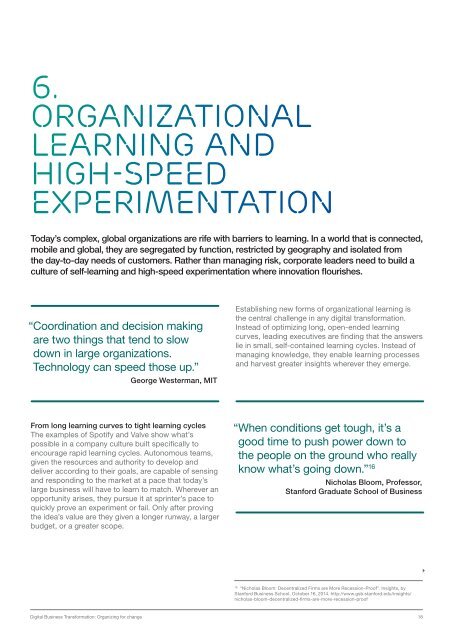ORGANIZING FOR CHANGE
UhUqd
UhUqd
You also want an ePaper? Increase the reach of your titles
YUMPU automatically turns print PDFs into web optimized ePapers that Google loves.
6.<br />
Organizational<br />
Learning and<br />
High-speed<br />
experimentation<br />
Today’s complex, global organizations are rife with barriers to learning. In a world that is connected,<br />
mobile and global, they are segregated by function, restricted by geography and isolated from<br />
the day-to-day needs of customers. Rather than managing risk, corporate leaders need to build a<br />
culture of self-learning and high-speed experimentation where innovation flourishes.<br />
“Coordination and decision making<br />
are two things that tend to slow<br />
down in large organizations.<br />
Technology can speed those up.”<br />
George Westerman, MIT<br />
Establishing new forms of organizational learning is<br />
the central challenge in any digital transformation.<br />
Instead of optimizing long, open-ended learning<br />
curves, leading executives are finding that the answers<br />
lie in small, self-contained learning cycles. Instead of<br />
managing knowledge, they enable learning processes<br />
and harvest greater insights wherever they emerge.<br />
From long learning curves to tight learning cycles<br />
The examples of Spotify and Valve show what’s<br />
possible in a company culture built specifically to<br />
encourage rapid learning cycles. Autonomous teams,<br />
given the resources and authority to develop and<br />
deliver according to their goals, are capable of sensing<br />
and responding to the market at a pace that today’s<br />
large business will have to learn to match. Wherever an<br />
opportunity arises, they pursue it at sprinter’s pace to<br />
quickly prove an experiment or fail. Only after proving<br />
the idea’s value are they given a longer runway, a larger<br />
budget, or a greater scope.<br />
“When conditions get tough, it’s a<br />
good time to push power down to<br />
the people on the ground who really<br />
know what’s going down.” 16<br />
Nicholas Bloom, Professor,<br />
Stanford Graduate School of Business<br />
16<br />
“Nicholas Bloom: Decentralized Firms are More Recession-Proof”. Insights, by<br />
Stanford Business School, October 16, 2014. http://www.gsb.stanford.edu/insights/<br />
nicholas-bloom-decentralized-firms-are-more-recession-proof<br />
Digital Business Transformation: Organizing for change 18


